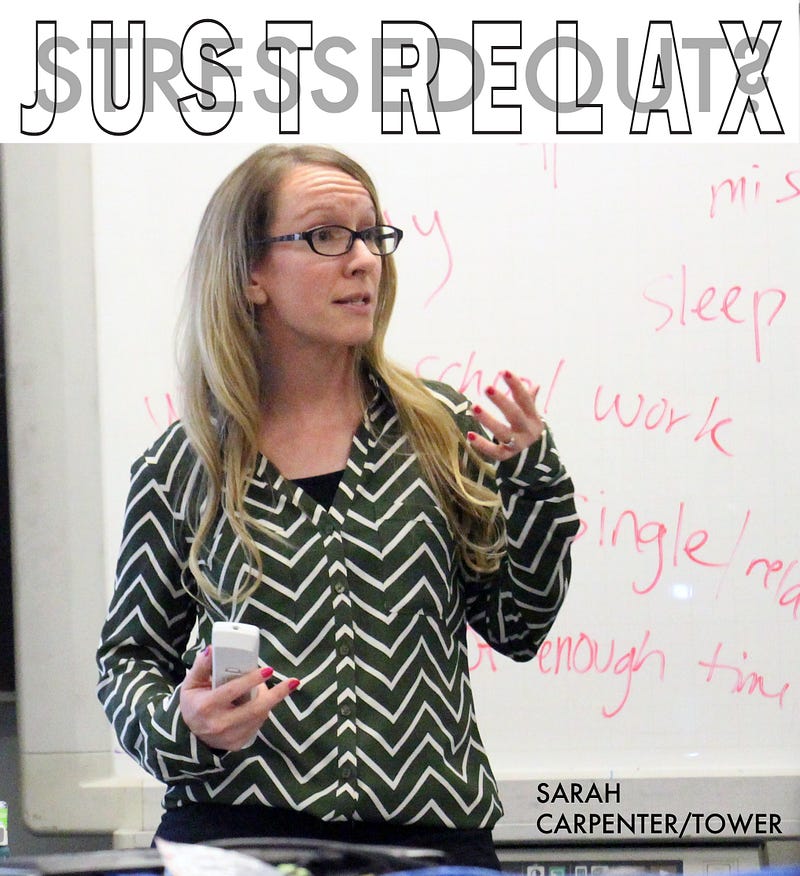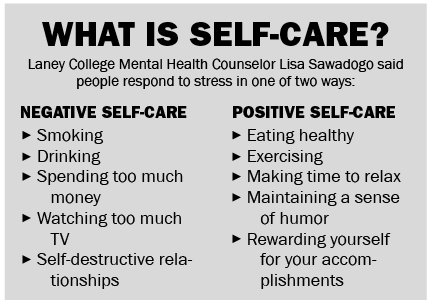
Laney mental health counselor shares methods for stress-relief
By Sarah Carpenter
Managing Editor
Lisa Sawadogo, a mental health counselor here at Laney, passed a student a half-filled water bottle. She asked the students how heavy it was.
Not very, they guessed — maybe 16 oz.
Sawadogo asked the student, ASLC Publicity Officer Laura Bloom, if she thought she could hold the water bottle for five minutes. Bloom said yes, but that her arm may drop after a couple minutes.
“What if I asked you to hold on to it for a few days?” Sawadogo said.
The point of this illustration, she said, was to demonstrate that “it’s not about how big your stress is — even if it’s just a little amount, you can only hold onto it for so long before it starts to hurt.”
LIFESTYLE ASSESSMENT
Sawadogo presented the Stress Management Workshop on April 25 in the Student Center. She asked the group — of about 15 — to fill out a survey she titled: “Is your lifestyle causing you stress?”
The survey asked people to check boxes that described 26 possible behavioral responses to stress, split into two columns: negative self-care behaviors, and positive self-care behaviors.
The negative self-care behaviors are those that are counter-productive, harming the self in the process of relieving it of stress.
These include smoking, drinking, spending too much money, watching too much television, and engaging in self-destructive relationships, among others.
The positive self-care behaviors are those that relieve stress in a way that contributes to overall health, like eating right, exercising, making time to relax, maintaining a sense of humor, or rewarding oneself for accomplishments.

Sawadogo asked if anyone was surprised by the lists, and one student responded that the bit about rewarding oneself surprised her. The student said she hadn’t realized that she wasn’t doing that for herself until she read it.
BECAUSE IT WORKS
“I get a lot of students telling me, ‘Lisa, this is all so cheesy,’” Sawadogo said. She will recommend things like spending time in nature and starting the day with positive affirmations. Students will roll their eyes. She sympathizes.
“So why is mindfulness important?” she said. “Because it works. It really, really works.”
Mindfulness is the practice of being present in a moment, calmly recognizing bodily sensations, emotions, thoughts, and surroundings. Sawadogo described feeling the chair against your back, the weight of your feet on the floor, the colors on the wall, and your emotional responses.
She said that being mindful offers perspective. “Reframing and getting some perspective can have a huge effect on stress,” she said.
According to her, so can one’s diet, sleep, exercise, routine, and other basic areas of self-care — areas in which many students experience disruption.
RESOURCES
Sawadogo included resources for a wide variety of needs in her handout. In addition to resources for mental health, she included those for domestic violence, housing, childcare, food, legal assistance, and rehabilitation.
Mental health counseling is available to all Peralta students. Each student is allowed 8–10 sessions with a mental health counselor (like Sawadogo) per semester. For more sessions, students may be referred to an Alameda County Mental Health resource.
More information can be found on their website at http://bit.ly/2qbvc1o, or to book an appointment call: (510) 464–3535.

























